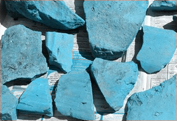 As
you can see, the results from last month’s resistivity survey of the Small Brook site
are looking quite positive. You may recall, Mark Hayward spotted indications of the Roman
Road here on an aerial photo, which we reported in Newsletter 51. They corresponded with
19th century reports of it as it crossed the fields at this point. Our survey covers an
area of 50 by 45 metres and the emerging picture is complicated. However you may be able
to detect a distinct linear feature running across the page from right to left (getting
wider towards the left). The darkness of the linear feature suggests a sunken way which may tie in the description given by the
Reverend Sibson in his 1845 report. This spoke of a hollow track in the adjacent Brook
Meadow and also leading up the hill towards Dangerous Corner. The feature also corresponds
with the line of the Road as indicated on the 1st Edition OS map of 1849. The dark feature
at the bottom right is huge and maybe associated with remnants of a clay pit shown on this
25 inch OS map of 1888/1892, which shows Small Brook Potteries located on the other side
of the field. Clay extraction may have continued here well into the 20th century. There is
also a deep depression in the top left hand corner, which may represent an old pit shaft.
Geological maps show coal seams from the Bickershaw 7-Foot and others outcropping in
adjacent fields, a distance of only a matter of a few hundred metres away. The survey was
truncated towards the bottom left where the field boundary-ditch cut across to meet the
Small Brook stream itself about 30 metres to the left. There is also a curiously high
(light) resistance feature running at right angles to our linear feature. With the
permission of the farmer, trial trenching in this field would confirm or otherwise our
observations. As
you can see, the results from last month’s resistivity survey of the Small Brook site
are looking quite positive. You may recall, Mark Hayward spotted indications of the Roman
Road here on an aerial photo, which we reported in Newsletter 51. They corresponded with
19th century reports of it as it crossed the fields at this point. Our survey covers an
area of 50 by 45 metres and the emerging picture is complicated. However you may be able
to detect a distinct linear feature running across the page from right to left (getting
wider towards the left). The darkness of the linear feature suggests a sunken way which may tie in the description given by the
Reverend Sibson in his 1845 report. This spoke of a hollow track in the adjacent Brook
Meadow and also leading up the hill towards Dangerous Corner. The feature also corresponds
with the line of the Road as indicated on the 1st Edition OS map of 1849. The dark feature
at the bottom right is huge and maybe associated with remnants of a clay pit shown on this
25 inch OS map of 1888/1892, which shows Small Brook Potteries located on the other side
of the field. Clay extraction may have continued here well into the 20th century. There is
also a deep depression in the top left hand corner, which may represent an old pit shaft.
Geological maps show coal seams from the Bickershaw 7-Foot and others outcropping in
adjacent fields, a distance of only a matter of a few hundred metres away. The survey was
truncated towards the bottom left where the field boundary-ditch cut across to meet the
Small Brook stream itself about 30 metres to the left. There is also a curiously high
(light) resistance feature running at right angles to our linear feature. With the
permission of the farmer, trial trenching in this field would confirm or otherwise our
observations. 
Twinning Project
“Dear friend,
I confirm that the association and I would like to set up a twinning and come over to
Wigan. I must admit that it is difficult to find a date available for everybody because of
our jobs. But we will try to find out one.
Moreover, I contacted Mrs Dominique De Ferrières, Portfolio Holder for International
Relations, who help us in our many actions. I think it would be easier for me if you could
tell us the dates you and the Society are available in 2002-2003 to arrange the meetings.
Thank you for your comprehension,
Best Regards
M. Brodeur Chairman”
This is the letter Tom has received from M. Brodeur of the Angers Archaeological Society
confirming that they want to twin with us. M. Brodeur has also sent us a gift of a book on
the Troglodyte caves in Doue-la-Fontain. It has been suggested we return the gesture with
a suitable book on some aspect of Wigan’s history - any suggestion?
Dutton’s Farm Field Trip
Ron Cowell of Liverpool Museum Services has kindly invited the Society to visit his
current excavations at Dutton’s Farm near Lathom House on Sunday 6th October. For the
last few years Ron has been working on the site during the summer months. It was first
discovered in 1998 when the Transco gas pipeline was being installed in the area. Since
then Ron and his team have uncovered late Pre-historic and Romano-British occupation in
the form of round houses and sunken track ways. The visit on Sunday has been arranged for
11.00am and should not last longer than a couple of hours. If you are interested please
contact a committee member or me so that we can arrange a meeting point.
Next Meeting
Wednesday 2nd October at the BP Centre (Scout HQ) in Greenough Street, at 7.30 pm as
usual. This month’s speaker is John Darlington who is the County Archaeologist for
Lancashire and his talk is on “Aspects of the Lancashire Archaeological Services
".
Hope to see you there, B.A.
|



